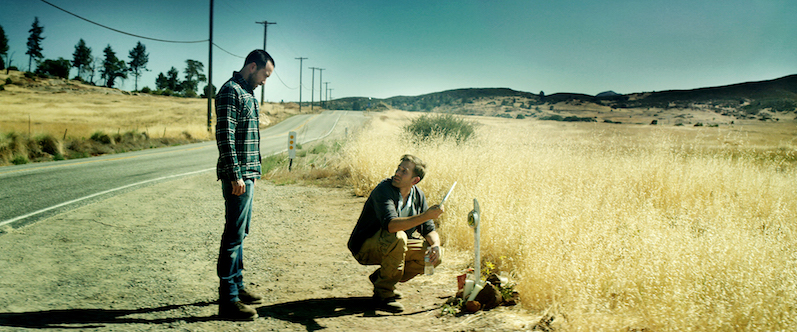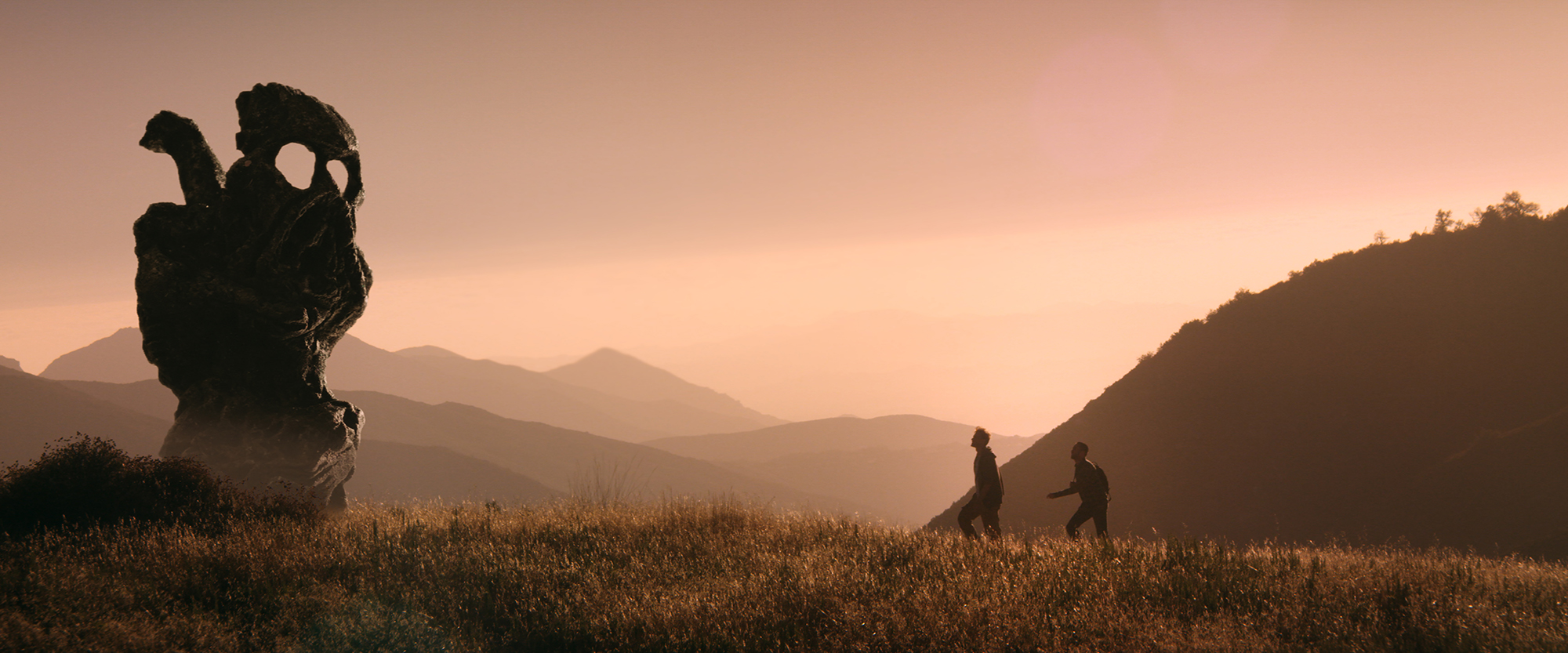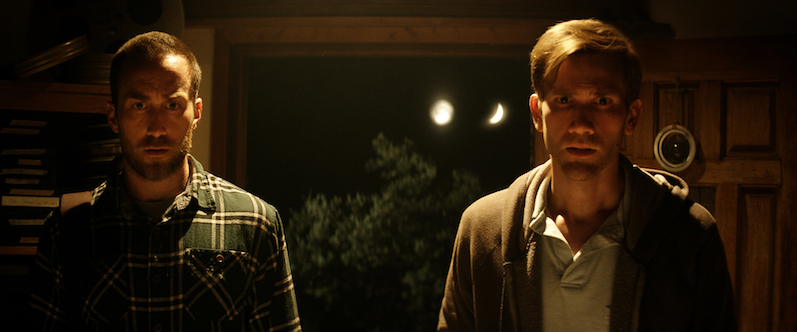The directing team of JUSTIN BENSON and AARON MOORHEAD first met as interns at Ridley Scott’s commercial production company. One was starting the job, the other was leaving the job, but they hit it off and eventually paired up as creative collaborators. As a filmmaking team (they co-direct, produce, and edit; Benson is the screenwriter; Moorhead is the cinematographer), Moorhead and Benson first gained notice with the micro-budget festival hit Resolution in 2012, followed by the international horror/romance Spring in 2015. They were selected by Variety as part of their “10 Directors to Watch,” and their renown is reaching new levels with the release of their latest feature film, THE ENDLESS.
In The Endless, a twisty, sci-fi thriller, the directors also take the lead in front of the camera. They star as two brothers who return to the “UFO death cult” they escaped years earlier, where they begin to question the truth about the group (and the universe). The film currently boasts a 100% Rotten Tomatoes score, and has received glowing coverage from Entertainment Weekly, Vanity Fair, the Los Angeles Times, and more. Distributed by Well Go USA Entertainment, The Endless (which premiered at the 2017 Tribeca Film Festival) opens in Los Angeles on April 13, before expanding to additional markets in the coming weeks.
We had the chance to talk with Justin Benson and Aaron Moorhead about The Endless, making movies on a DIY-scale, and how to find your filmmaking collaborators.
——
COLIN McCORMACK: Not to start things off by sounding like a complete Hollywood cliché, but you guys have a lot of “heat” right now with this film. Your first film [Resolution] had a pretty small release, and then Spring gained a little more attention. Does The Endless feel like it’s at another level for you guys personally?
AARON MOORHEAD: Yeah, it actually does. I think it’s a combination right now of the fact that we have a little cottage industry from our last two films; a following where maybe someone’s seeing our movie now. It’s that and we’ve had a really robust festival run, and I think that really helps. The festivals have been so incredibly supportive and you get heat out of them. It’s cool. It does feel like we’re doing something pretty cool.
CM: Is there a strategy involved when you guys are figuring out what film to do next, in terms of Let’s go a little bigger with the next one, let’s go a little bigger with the one after that. Or is it just about whatever story is striking you at the moment?
JUSTIN BENSON: It’s a complicated answer because at any given moment we’re in different levels of development with about three different TV shows and about three different movies. Then luckily there are always little projects floating around and we’re just constantly working on that stuff on a day-to-day basis. And I think with The Endless specifically, it was conceived in the ethos that this one will be self-reliant. Let’s make something that has some magic and scale to it, but how do we do that while still going down a road of making something that we can definitely make no matter what and nothing will stop us. Because something we’ve realized between every movie we’ve made is that it’s very easy to start going down this path and chasing this carrot of doing something with a much bigger budget – which we will do someday – but it can end up taking a lot of time waiting on things like casting and waiting on partnering with a producer who has the clout to do it. So I guess the brief answer is we set out to make the biggest movie we could, but also in a way that nothing could stop us.
CM: I read that you start production – I don’t know if it’s just for The Endless or if you’ve done this with every film – where you start with a checklist of basically whatever you have at your disposal?
AM: Yeah, essentially it was that. We did that with Resolution and we did it with The Endless. Not so much with Spring, and that was kind of a naïve mistake but that luckily turned into a movie we liked. But that’s part of our process now. It’s not going to be every single time; we have plenty of larger budget things in the works, but if we’re setting out to make a DIY movie, a total hand-over-fist self-reliant thing, I think it absolutely had to start out with the idea of just making a checklist figuring out what we could make before we also figured out what we wanted to make and saw where the synthesis of those two ideas came.
CM: What’s your collaboration process like? Justin, you’re credited as the writer but are you working off of a pitch or idea you and Aaron came up with together? Does the collaboration start once you finish the first draft? How does that work?
JB: The way we do everything is that yeah, I’m authored on the script because I’m behind the keyboard, but it would be almost impossible to list all of the ways that it’s collaborative. Aaron has just as much of a hand in these stories as I do, I just happen to be credited as the person behind the keyboard; a relatively trivial title. Being a screenwriter is a very interesting gig. It’s a life of constant notes.
CM: When you first started working together, did you both fall into your roles naturally or did it take some time to figure out who excelled in what areas or who had more interest in certain areas versus others?
AM: It’s not quite like that. We’re ever so slightly different people but for the most part, we just view the whole thing as the task of filmmaking. So it’s kind of like saying, “Okay, we’re going to do the dishes together. You’re way better at drying and I’m better at washing.” You kind of just do it; you occasionally take this role, you take that role. Another analogy I found recently is it’s like you’re a server and you’re balancing a whole bunch of teacups full to the brim. And it’s not like I hand Justin half the teacups, it’s that we both hold the same tray and make it more stable. So that’s how we work, it’s not quite so divvied up like that. There are a few things, as he said he’s the writer, I’m the cinematographer, but we don’t lock each other out of those processes.
CM: I assume since the characters are named Justin and Aaron that they were written knowing you both would play them?
JB: Yes, the characters were meant to be things we could dramatically pull off, but the reason for the names is just this weird thing where these characters occur in our first film Resolution. You don’t need to see Resolution to comprehend The Endless in any way, but what we didn’t want to do was to negate anything that happens in Resolution or mess up the continuity for those who would care – including us in that camp – we wanted it to make sense if people discover this small film that shares some continuity. And in that movie, our names were Justin and Aaron out of sheer laziness. And now we’re stuck with it. It creates an interesting thing where unfortunately sometimes people think that it’s an indicator that it’s more autobiographical than it actually is.

CM: You said you were in Resolution as those characters, so you have some acting experience. Were there any “gatekeepers” nervous about you guys taking on these roles since they’re the leads this time?
AM: No, there weren’t really any gatekeepers that were too concerned about it, just because it was going to be hand-over-fist and we were going to be the gatekeepers. We were going to be the people that financed the movie as well, so we were like, Well no one can really stop this. But we have a third producer Dave [Lawson], and he was like, “I’m sorry, I just need to see you guys perform before we do this. I just need to see it.” So he came over and we more or less auditioned for him, which was terrifying. Could you imagine it’s your movie and your producer is like, “You guys are going to ruin your own movie if you do this by being bad actors”? But luckily, he was convinced. Then when we got some actual financing – it’s still a very low-budget film but we didn’t have to pay for it ourselves – our financiers came on board knowing already that we were playing the leads.
CM: Is there anything specific on the acting side that you picked up from previous actors that you’d worked with as directors?
JB: Some of the biggest lessons in performing that we ever learned were from the other actors that we worked with and directed in our other films. There have been a lot of lessons learned, but one of the best ones I’ve learned interestingly enough is to trust the director. What I mean by that is a very specific instance of you do a take of a performance and let’s say you do it 12 times, and some of those takes you really, really feel it internally what you’re doing. Some of them you don’t feel it as much internally, but something I’ve noticed about working with other performers is that you need to trust that the person behind the monitor knows when you got it or not. There are a lot of times where you think you didn’t, but actually, the best take is the one you had no idea about.
AM: I would add on the importance of the backstory. Every one of our characters in this one had a pretty deep backstory you can feel running in the film like an undercurrent. The best example of this is Lew Temple, who we got to work with on this. He has I think three to six lines in this film and a few ominous looks. And weirdly enough, because we spoke to him for at least six to nine hours about backstory on this, and he is so curious about life and about his character and about his work, that he kind of has this Socratic method of preparing for a character, of asking us so many questions, and figuring it out all the way down to the tiniest button. And you wouldn’t know what that would do until you see it on set and see him do it. He’s this character that weirdly just resonates with looks and with stillness and with interactions between other characters; he just finds it. That’s pretty incredible that just a backstory plays into a look with him.
CM: You talked about trusting the director, but in terms of being both the on-camera talent as well as the directors and Aaron as the DP, you have to trust a lot more of your crew than if you were just doing one of those jobs. How difficult was that to juggle when you guys were acting and relying on other people?
JB: It’s interesting because there’s a lot of the movie where Aaron and I aren’t in the same scenes together, so when I say, “Trust the director,” in this case I’m saying, “Trust Aaron.” Or Aaron trusts me. Because usually, it would end up with one of us on monitor, obviously, if we weren’t in the scene. The other thing too is a lot of the people that worked on this are people that we’ve been working with over several movies now. That was very helpful if we were both in front of the camera, having those people on monitor watching what was happening because they – at this point after a decade of filmmaking – most people know at this point what we’re looking for. They know what our aim is and all that.
CM: In terms of either building that crew from the people who have been with you from project to project, to bringing new people on, in your opinions what’s the key to finding the right collaborators?
AM: It probably feels like very intense dating because you don’t get to just see someone for an hour and realize you don’t like them. You have to hire them and work with them first and then realize whether or not you’re in sync. It’s a lifelong process of gathering your little army. I don’t envy people who haven’t found most of them yet. Luckily over our career, we feel like we’ve found our favorite crew that we can possibly hope for. I would say it’s a lot more important than people think. I think a lot of people think: Find your director, find your writer, find your producer and actors, and everything else falls into place. But personally, I would be quite concerned shooting a movie with a gaffer I’d never worked with before, and so on.
CM: How isolated were you guys on your location for The Endless?
JB: I mean, it was a location shoot for sure. We were all living together at the camp you see in the movie. It’s not that isolated, it’s more like being in a very small town. We had one store down the street. There’s one restaurant up the street. It’s a little town called Descanso that’s about an hour east of downtown San Diego.
CM: So when you guys were putting together your cast and crew, these aren’t people you’re just going to be working with on a 10- or 12-hour day. These are people that you’re potentially living with. Did that come into play when you’re interviewing or casting people? Like, I am going to be spending a lot of time with these people. Can I stand it?
AM: All of our films so far have been location shoots, so we’ve been prepared for exactly what you just said. But I will say it mostly came into play in casting because we thought: Okay, these are people who have never worked with us before, they don’t have the circle of trust and all that, so we need somebody who can be okay when there’s no makeup artist; somebody that can be okay when they’re staying in a cabin. It’s interesting to take that kind of factor into account when you’re casting a movie. But luckily, thank God, all of our first choices we were able to get and they were all so down to go out camping with us for a few weeks. We had to explain that when offering the role: Just so you know, this is kind of a rustic location, so be ready to be hanging around the campfire and passing the ol’ whiskey bottle around at night rather than heading back to your hotel room.
CM: How many days did you guys shoot?
AM: 17 days. Actually, I think it was 19. We had two here in Los Angeles.
CM: You talk about it as a DIY-type movie, but I assume all the visual effects can throw a wrench into how scrappy and DIY it can be. You hear about “previz” happening on big tentpole blockbuster movies. Is something like that even feasible on a low-budget production with a lot of VFX?
JB: We can’t even afford storyboards, to be totally frank. [Laughs] What it is is Aaron’s a visual effects genius and what he specializes in is something called 2D compositing, and when I’m writing the script I’ll start by asking him things he won’t even try, things he’s interested in. And he knows at that point what the story is so he can focus on like, What can I do with this? What will be interesting? We’ll – in the spirit of being self-reliant – come up with things that if Aaron had to do, he could probably do them on his own. So the script is constructed in that way. Then obviously when we’re location scouting, he’s constantly working out what are going to be the problems if we don’t shoot this in a particular way when we get into post. And that could be issues of “day for night,” that could be issues of “how’s the skyline looking? Am I going to be able to use that as God’s blue screen?” Stuff like that. So previz? No. But still made in pre-production through preparation.
CM: In the post-production process, what was it like editing yourselves?
AM: That was a really interesting process because we talked about different theories of how that would go. Like, do we edit each other or something like that? And we found during watching dailies that we could use our regular process, which is a very odd one: We each take half of the movie, edit it, and then we swap. That shouldn’t work but it works great, I don’t really know why, but we like it that way. What it was that we just found ourselves doing, we were watching dailies together and we were pointing at the screen and referring to ourselves in third-person. Like, “Oh, Aaron made a stupid look right there.” “Justin blinked at the wrong time.” Stuff like that. We realized in those moments that we were completely disassociating from the person on-screen. And it’s not like we’re dressed like Abraham Lincoln and doing a Russian accent or something. We’re not disappearing completely; it still looks very much like the man I see in the mirror. But for some reason, being on-camera and being Aaron in real life, we’re just so different that there was no vanity behind any of the choices. We’d just make it happen as if it were any old actor.
CM: Selling and marketing a film that has plot twists or an out-of-the-box idea can be tough. Were you able to have a say in any of the marketing aspects with your distributor?
JB: Yeah, we’ve been really blessed in that all three movies that have been released out into the world, the marketing department and the distributor have collaborated with us quite a bit. I use the term “collaboration” sort of timidly because they do most of the work, but they at least loop us in and they ask for our opinions. There’s been almost nothing that’s gone out into the world that we don’t fully approve of on any of our films, but specifically this one. We love that poster. We love the trailers. They’ve done such an amazing job. Then in terms of how much gets revealed to people, we think what they’ve chosen to reveal is good and the way into the movie is good. Just based on traveling with the movie to film festivals for a really long time and getting real-time feedback from people in terms of why they came to this movie, what the marketing department is doing is very in-line with that.
CM: Has the reaction when you’ve gone from festival to festival been different from the people who are maybe new to your films versus the people that have seen Resolution or Spring or might view The Endless as part of a “universe?”
AM: The reactions have been different but the same quality, which is really interesting. Because if you’ve seen Resolution, you get a little bit more out of it, almost like an Easter Egg. And that can feel really delightful if you feel like you know a little secret that no one else does. But what’s cool about if you haven’t seen Resolution is that the movie is all mystery. You know nothing about it and you can’t intuit anything about what came before it in Resolution. And still, the movies answer each other’s mysteries, but you can’t really reuse the information from one to the other to figure the movies out. So it still holds plenty of mystery for people who have seen our movies or not. Some people are overjoyed at the weirdness of this little world we’ve created and some people end up pleased to get to revisit it.
CM: You mentioned earlier you have a lot of irons in the fire with TV ideas and film ideas. Do you have something concrete for your next project lined up, or are you still working on a bunch of stuff and aren’t sure what will take the lead next?
JB: The latter. We’re in a position now where we’ve “sold” a couple TV shows, but that just means we’re employed to write a pilot. It doesn’t mean it’s necessarily going to series; it’s still got a much further way to go down the line. Then with movies, we’ve got several different movies of very different scales, one of which is probably something that we could just go and make. But if it turns out when we take a closer look at it that it’s actually a little too expensive, then we’re going to sooner than later write another movie that we can just go make while we’re waiting for these other projects.
CM: Is that more to keep your skills sharp, or you don’t like waiting around? As opposed to waiting and scrounging up money for a bigger one, what makes you want to come up with these smaller-budget movies you can go out and do on your own?
AM: I think it just comes down to the fact that we’re filmmakers, and if we’re not making a film then we’re just sitting in our apartments losing money. [Laughs] So we might as well just go make a movie and make sure it’s as little compromised as we can. There are ways to design movies intelligently so that doesn’t happen. As long as you’re able to do that, if you’re a filmmaker I think of it more as chasing my own happiness. So I’ll do it whichever way that works.

__
Thanks to Justin and Aaron for taking the time to chat with us about THE ENDLESS. Follow the film on Facebook, Twitter, and Instagram.
This interview has been edited for clarity.
If you’re an independent filmmaker or know of an independent film-related topic we should write about, email blogadmin@sagindie.org for consideration.



